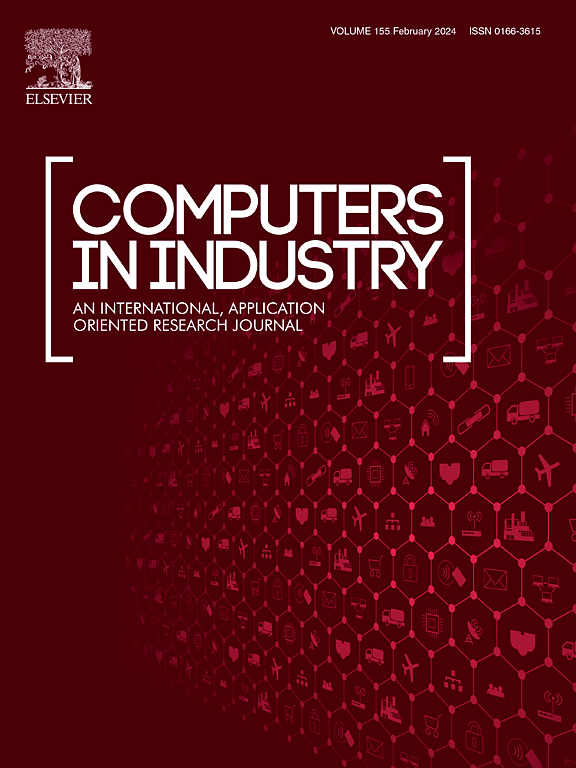Integration of industry 4.0 technologies for agri-food supply chain resilience
IF 9.1
1区 计算机科学
Q1 COMPUTER SCIENCE, INTERDISCIPLINARY APPLICATIONS
引用次数: 0
Abstract
The agri-food supply chain (AFSC) operations are becoming challenging due to globalization, constantly shifting consumer demands, and intensive disruptions leading to inefficient production and distribution of safe and high-quality food. Technological advancements are the most promising ways to ensure firms’ survival and supply chains. To enhance the resilience of AFSCs, the present study aims to identify and model the challenges associated with AFSC operations in the context of the United Arab Emirates (UAE) food processing industry. An integrated methodology using the Grey Influence Analysis (GINA) and Fuzzy Linguistic Quantifier Ordered Weighted Aggregation (FLQOWA) methodology is applied to analyze resilience enablers and assess industry 4.0 technologies (I4Ts) that can enhance resilience in AFSCs. The GINA technique helps identify the most influential resilience enablers, and the FLQOWA helps assess and prioritize I4Ts to enhance resilient enablers. The findings reveal that out of thirteen sub-enablers, four are the most influential resilient enablers, viz., real-time information sharing, enhanced product traceability, improved risk management, and planning and network design; and out of ten I4Ts, three are the most influential technologies viz., big data analytics, Internet of things, and cloud computing can further enhance resilience enablers. The findings from the study can help AFSC organizations and the government formulate appropriate strategies based on the integrated matrix developed by selecting the best combination of technologies for strengthening the required resilient enablers among the AFSC stakeholders.
整合工业4.0技术提升农业食品供应链弹性
由于全球化、消费者需求的不断变化以及导致安全优质食品生产和分销效率低下的密集干扰,农业食品供应链(AFSC)的运营正变得越来越具有挑战性。技术进步是确保企业生存和供应链的最有前途的方法。为了提高农产品加工企业的应变能力,本研究旨在以阿拉伯联合酋长国(UAE)食品加工业为背景,识别与农产品加工企业运营相关的挑战并建立相关模型。本研究采用灰色影响分析(GINA)和模糊语言量化有序加权聚合(FLQOWA)综合方法来分析抗灾能力增强因素,并评估可提高阿联酋食品加工业抗灾能力的工业 4.0 技术(I4T)。GINA 技术有助于确定最具影响力的复原力增强因素,而 FLQOWA 则有助于评估和优先考虑工业 4T 以增强复原力增强因素。研究结果表明,在 13 个子使能因素中,有 4 个是最具影响力的复原力使能因素,即实时信息共享、增强产品可追溯性、改进风险管理以及规划和网络设计;在 10 个 I4T 中,有 3 个是最具影响力的技术,即大数据分析、物联网和云计算可进一步增强复原力使能因素。这项研究的结果可以帮助阿富汗国家安全部队组织和政府根据综合矩阵制定适当的战略,选择最佳的技术组合来加强阿富汗国家安全部队利益攸关方所需的抗灾能力。
本文章由计算机程序翻译,如有差异,请以英文原文为准。
求助全文
约1分钟内获得全文
求助全文
来源期刊

Computers in Industry
工程技术-计算机:跨学科应用
CiteScore
18.90
自引率
8.00%
发文量
152
审稿时长
22 days
期刊介绍:
The objective of Computers in Industry is to present original, high-quality, application-oriented research papers that:
• Illuminate emerging trends and possibilities in the utilization of Information and Communication Technology in industry;
• Establish connections or integrations across various technology domains within the expansive realm of computer applications for industry;
• Foster connections or integrations across diverse application areas of ICT in industry.
 求助内容:
求助内容: 应助结果提醒方式:
应助结果提醒方式:


